|

Odd insect (Family Reduviidae - Assassin Bug) on thin-leaved coneflower,
Rudbeckia triloba.
(*photo credit)
July 1, 2011 Preparing
for the Second Half of 2011
Stay
cool! July is the time that tries our souls. It is so hot that it does not
take much to disturb us and to trigger harsh things. That is not a good way to
begin a mini-New Year, especially since so many make today, rather than January
first, the start of the annual budget. Accepting July first as a new beginning
invites us to review our patterns of action and discover that the start of the
hot summer is a good time to be more sensitive.
Insensitivity in all
its forms restricts our understanding of the common good. People run from the
needs of others and focus on more self-centered individual needs. The sin of
affluence desensitizes individuals from the concerns of others; the sin of
excessive property (clothes, residences, vehicles) removes the holder from
realizing the essential needs of others in these struggling times.
Insensitivity on a grander scale leads to spiritual impoverishment and results
in attempts to establish security through military defense and larger and larger
financial investments.
Some regard concerns about
global commons as impractical. "My steak would spoil before it reaches the
hungry in Africa," is hardly an excuse to forget food sharing, because the
transportable grain that fattened the beef cattle (source of the steak) could
have been fed to others at a distance. To share with the hungry requires that
we reduce our use of resources even if this entails an added expense. Social
assistance must be increased, not shaved during this time of belt-tightening.
Wealthy alarmists can paint vivid pictures of the poor taking materials from
gated-communities. In their opinion their personal privileges allow them to
enhance the current economic and political system, and lead them to believe they
know best how to manage their treasures. Affluent individuals see nothing wrong
by engaging in unsustainable practices, because they see no need to share with
future generations. Their lack of a commons concept is evident and harmful.
They remain sequestered from the commons as long as a system supports this
"legally."
The
Principle of Enough when fully understood focuses primarily on essential
needs of a global community as community -- and not as individuals. The concept
of "commons" understood as healthy sustaining local communities refutes the need
for outsiders to come and manage their affairs provided the local community is
healthy. When local communities hurt from drought or other natural or
human-made disasters, responsibility for the hurting human family members become
paramount. The temptation is to isolate ourselves in our own concerns and not
to have a global outlook -- summer is a tempting time to go totally local with
little regard for the rest of the human race. Let's not let this happen.
Prayers:
Help us, Lord, to be sensitive to the needs of all, not just those in the local
community, but for unfortunate people throughout the world.

Fungi on the forest floor.
(*photo credit)July 2, 2011 Plutocratic
versus Democratic Ways: Tax the Rich!
Independence is never
definitively won; it is forever an ongoing process. An American
Revolutionary
Is
it possible that our democracy could be -- or has been --taken over by a
plutocratic system of governance by the wealthy? The answer by average citizens
is that this is a remote possibility which would be caught by vigilant
citizens. People still vote, pay taxes, get responses from Congresspersons, and
watch TV debates on major issues, but what if this is all charade and real
government goes on behind our backs? Some on the liberal left are convinced
that this is actually the case in the United States at this time given the
record profits by Wall Street, the feeble efforts at reducing taxes for ALL at a
time when dependent mothers and infants are seeing funds reduced. They point
out that certain quite profitable corporations pay no taxes at all due to
specific exemptions granted by legislatures beholden to them. Is this
description valid and, if so, can the course be reversed by a democratic people
bent on upholding freedom for all?
The
disparity of wealth in this country is a reality that few of us can overlook.
We have a heavy portion of the world's billionaires who can do what they like
with their wealth. The top of the heap is the 0.1% of the income level who
make the most and have the political establishment behind them. The voting
habits of most Senators respond to the desires of the wealthy, not the average
citizens, a phenomenon that characterizes both parties. Too much big money is
at stake and elections depend on big money. "Bigness" comes from wealth; this
bigness means power and access, and access means influence on the laws that
ensure bigness. "Democracy be damned!" The most astounding thing is that polls
show a major part of the electorate wants no new taxes for ANYONE, even
plutocrats.
The Church has a greater
mission to do than teach patience to the underprivileged. In fact, the Church
must be on the side of the public, not the private domain. In such a mission,
the Church condemns plutocratic practice openly and seeks to strengthen the
enforcement and vigilance required by a properly functioning government.
Amazingly, Church ought to be a catalyst for change for the better, not the
guarantor of an imperfect status quo. Jesus exhibited holy anger at the
economic situation of the Temple, a place privatizing space meant for ALL the
people. Jesus stood clearly on the side of the public domain. Jesus challenged
an unjust system in driving moneychangers from the Temple, and leaders sought to
kill him for challenging the status quo. Jesus' followers should act in a
similar fashion and get angry with a privatized plutocratic system. Let's
require fair taxes for ALL . We can make certain changes although this takes a
will to change.
Prayer:
God, grant us the serenity to accept the things we cannot change; courage to
change the things we can; and wisdom to know the difference. Serenity
Prayer, Reinhold Niebuhr
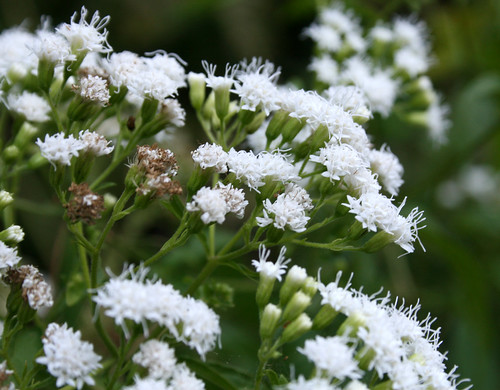
White Snakeroot , Ageratina altissima.
(*photo credit)July 3, 2011
Meek and Humble of Heart -- And Also Angry
Take my yoke upon
you and learn from me,
for I am meek and
humble of heart. (Matthew 11:29)
During
the July Fourth weekend we ought to reflect upon our attitudes about
citizenship. Is it possible to get enraged about what is happening to our
overlooked brothers and sisters, and still be people who are meek and humble of
heart? Let's consider the coexistence of meekness and confrontation.
A yoke is something
that ties one down to do work -- and still it can be either a yoke for an
individual or a team yoke for pulling a load together. Let's first consider all
yokes as really team ones with the Lord as the hidden teammate on those called
singular. We learn from Jesus by imitating him in the way he carried his
burden within a context of prayer. We note in the Gospels that Jesus was public
in his confrontation with leaders of the temple precincts, that he acted through
prayer in the Spirit, that he never waffled but was straightforward, and that he
accepted the risks and consequences of his confrontations. Actually a
combination of all these elements leads to being meek in openness and
humble in using the simple means at one's disposal.
We
all have our crosses. Individually, we are invited to accept our "cross" and
ask the Lord to join in the yoke of carrying it without complaint and with
cheerfulness and good will. However, all Scripture has a dual dimension, and
there is a social aspect, especially to this seemingly personal situation. Our
crosses can become civic and not just personal duties, worthy of sharing with
others in similar circumstances. As team players with fellow citizens we do not
allow another's individual burdens to be isolated from public concern. In fact,
in such cases meekness and humility involve awareness of others' conditions and
our willingness to support them in their struggles.
We learn from Jesus to see
the situation at hand clearly. We recognize oppression (a condition many
affluent people overlook), and we can show compassion and offer a healing balm
for the oppressed. Jesus drove out moneychangers, because they had turned a
house of prayer for all the people into a den of commerce for their own
self-gratification. One level of the perfect ecologist is to give personal
attention to burdened individuals. On the other level, we humbly accept the
risk of confrontation that includes the possibility of losing. Here meekness
means a willingness to accept consequences, to do so with righteous anger, and
still not to be carried away by emotion. The way of Jesus is thus the perfect
balance of all emotions, allowing each to be operative in its turn and to be
sensitive to the needs of all in the process.
Prayer:
Lord, teach us to be meek and humble of heart, but not to lose the anger
triggered by injustice to our neighbor.

Katydid on trail map.
(*photo credit)July 4, 2011 American
Independence Minus Pretensions
The
story of the American Revolution is retold many times and is celebrated by
countless fireworks and multitudes of cookouts and patriotic speeches. We
should ask sincerely, "what does this day mean today?" Let's not fool
ourselves; this is the twenty-first century. Long ago our nation became
independent from the apron strings of Great Britain though it took two wars to
do it. Our nation thrived in splendid isolation for over a century until
European conflicts expanded into two world wars -- and our country was drawn
squarely into the middle of both and remained afterwards as the self-appointed
"policeman of the world." History moves on, and our country is now threatened
with financial insecurity in ways never before imagined. Are we so utterly
independent?
Looking
deeper, we discover that our struggle for independence takes on a twenty-first
century character. If we went from these united states to the
United States in the first two centuries, now we ought to accept our globalizing
role. From federalizing desperate colonies to the benefit of all, why not lead
in uniting a group of nations into a federated world body? Here our insight in
union will be enshrined in our letting go of nationalistic ways and accepting a
global power greater than the United States. Granted, patriotic words will fly
and not all will follow their ancestors in their struggles for union. The
process is inevitable but slow, and we may not live long enough to see its
positive fulfillment.
We
can be fooled by excessive property and passing fame, by wasting abundant
materials, and the fiction that our resources are endless. However, the sooner
we assume a true "independence" that is not pulled down by material allurements
and see plainly where we are, the better we can be leaders. Our is not to
conquer others but to march together with them. Yes, we could be called to
greatness, a call to be the first to see that going it alone is neither
sustainable nor a path to security. Our brothers and sisters throughout the
world look to us to show that the movement to freedom, first espoused in the
1770s, is to be extended to all peoples -- especially the hungry and ailing.
Privilege
comes in many ways. It is defined by more that who is the wealthiest, best
educated, most notable, or who is able to travel independently by car to
anywhere in a vast land. Privilege has a deeper spiritual meaning, which refers
to being the first among equals who finds the means to be strengthened in unity
of purpose and goals. America was first in some ways of acquiring and retaining
basic freedoms; we became first when we guaranteed the historical goal of
establishing a free society. History continues and fidelity to basic
independence is to abandon pretensions to greatness and seek a global
independence for all.
Prayer:
Lord, keep us focused on reality; let us not bend to idle musing about a
fictitious yesterday; now and tomorrow ALL deserve freedom from want.

Oxeye daisies in full bloom.
(*Photo by Sally Ramsdell)
July 5, 2011 Trying to
Make July Tolerable
Some
of us are more summer people than winter ones. However, we do have sympathy for
those who find it difficult to endure either the extremes of cold or heat. We
summer people have to admit that more die directly from heat extremes in our
country than from freezing weather. Each year when the hot weather arrives, the
role of people who succumb to heat (sometimes these include young athletes on
playing fields) seems like a battle listing. The key words were "die directly
from heat," because in winter many succumb to related ailments such as pneumonia
and flu that are triggered by chills and cold weather. Summer takes a toll that
could be reduced by attention to certain details. Here are some suggestions:
*
Stay cool. The hottest part of midday is not the time to hike, garden,
jog, or play games -- if you must work outdoors take your good time. Really,
this is when we ought to find a cool space to nap or rest in the shade. Let's
take a classic siesta.
*
Keep hydrated. It is not a time to fast from water or non-alcoholic
drinks of any sort. If you sweat much, try to replace the electrolytes found in
appropriate drinks. Spread the same suggestion to others who neglect carrying a
water bottle.
*
Read a little more. Mid-summer is really a perfect time to catch up on
all of the heaps of literature you have been putting off. Each completion is a
summer achievement.
* Air out the house at
night. Avoid overuse of energy-consuming air conditioning. I use none in
my residence, but my large elms and maples are the equivalent. For safety's
sake, if you must, use it sparingly. Open the house at night, and close off
during the day.
*
Eat less. July's heat makes the temptation to restore body carbs and
fats a little less attractive. In fact, this is an ideal season to trim down,
for that helps us endure the heat.
*
Have a cool treat. This could be ice water, chilled watermelon, or a
good tomato.
*
Rise early. Accomplish outdoor chores before the sun is in the middle of
the sky in its daily arc. Do what needs to be done in the early hours,
especially when the sun has just risen and there is dew on the grass.
*
Inverse Internet periods. Many like to spend times of dark before the
computer screen. "Inverse" means the hotter daylight times are better for
emailing, blogging, googling, and scanning than traditional night time work,
which is best used for resting.
Prayer:
Lord, help us to continue to pray even in the hot weather, to take all
precautions due to the heat, and to find some opportunities to reflect on the
summer blessings you have given us.
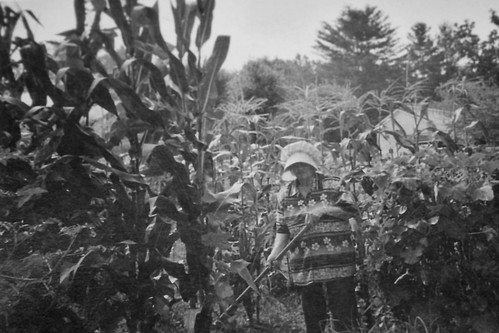
Work in the garden on a hot July day in Kentucky.
(*photo credit)July 6, 2011 Is
Credit-Card Enslavement a Wakeful Nightmare?
I
went to a motel at Corinth, Mississippi, on the stormiest spring night this
year. That night, camping out was impossible. The clerk at the town's
Econolodge pointed to the signs behind her that stated that they only accepted
lodgers who were credit-card holders. I told her I had cash and "I do not
believe in credit cards." In the state religion of Capitalism, one must believe
in credit cards or you cannot live. "If I had to have credit cards I would be
beholden to the banks -- and owned by banks, which declare by a credit rating
whether economically I live or die." The rain poured down in sheets outside,
but the clerk stood firm -- "No card, no lodging." Fortunately, the neighboring
motel did accept cash and that clerk admitted that others had told the same
tale. My formal complaint to the Federal Trade Commission was that this
platinum-award-winning motel did not honor our American currency.
This incident triggered
additional thoughts: we are enslaved to banks and yet slavery in this country
is outlawed. These banks enjoy the honor of defining our acceptable behavior
through their own credit ratings whether we ever had a debt in our lives. Since
no organization I ever operated had a debt, we have no "rating." To be without
a credit rating is to be a non-person, a person bereft of economic life, even if
that life is an affirmation of a system of greed. In telling this tale I
discovered that others regarded my reaction as abnormal, and that living with
credit is the normal route to ordinary citizenship.
Credit
is now routine and to have paid bills for debts is the sign of stability and
acceptable citizenship. But why must one be indebted? There is an easy
answer. Debt is the mark of acting properly with this society, and
credit is related to one's conduct in a longer-term indebtedness. Our currency
has given way to the "credit card" held by one of the few major banks
controlling our land with an iron grip. If you want to function and have
economic life you must be indebted and wiling to pay off the debts at a regular
rate. In turn, the banks are to make profits, to reward their executives with
large salaries, and to conduct any business they desire since they are too big
to fail. If they fail, the taxpayers will go into deeper collective debt in
order to ensure their continued life.
The
patience of non-credit card holders (the few of us left) is worn out when
helpful souls try to explain to us how we are to kow-tow to the system in order
to survive. They tell the young to get indebted quickly, so they can build a
good credit rating as good slaves to the system. If they become dutiful peons,
they will be rewarded with a future and, if fortunate, they may become
successful captains of the system. In their limited views, "What more is there
to expect in life?"
Prayer:
Lord, my prayer is not that my barriers be removed, but that I am able to stand
by my convictions and present them dispassionately to others.
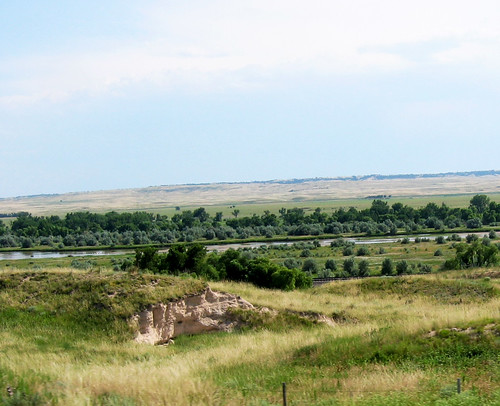
Western Nebraska in mid-July.
(*photo credit)July 7, 2011 Giving the
Emptying Plains Back to Buffalo
As
a person who considers the bovine family my "spirit creatures," and by being
born in the "Buffalo Trace" section of Kentucky, I have a special affinity for
the buffalo. More importantly, this affinity includes freedom to roam at will
by the buffalo (or more correctly American Bison, see September 12,
2006). These animals roamed the Great Plains, were a food and clothing source
for Native Americans, were drawn annually to salt springs such as the ones near
my Kentucky home, and became an integral part of North American folklore. The
Jesuit missionary, Pere Marquette, was perhaps the first to describe buffalo to
Europeans in detail.
I
once suggested to a Great Plains monastery that the monks ought to substitute
bison for their cattle-raising operation. This was not received well. Only
then did it become apparent that this was a threat to the status quo traditional
range-dwellers. A rejoinder to their opposition is that bison meat is truly an
economically viable alternative to beef because it is rich in protein, lower in
fat, cheaper to produce, and this form of livestock is native to, and can easily
withstand, the rigors of the Great Plains winters. However, buffalo growers
need good fencing, because these animals have in their genes the instinct to
roam. On the other hand, recent breeders have inserted more domesticated bovine
genes into buffalo, which dampen their roaming urges.
History
is really on the side of the buffalo. Rescued by attention to native species
restoration, a remnant herd has now increased to hundreds of thousands, but
nothing like the estimated 80,000,000 at the time when Lewis and Clark took
their first expedition to the Northwest in 1803. The tide is turning, and what
could happen in the twenty-first century is that buffalo will cover the
prairies. Is this an idealistic effort to return land to its more natural
state? This is a practical acknowledgment that harsh winters with snowdrifts
and harsh summers with hundred-degree-plus temperatures are agreeable to Great
Plains buffalo.
With
the propensity to roam reduced by genetics, when contented with company, proper
feed, and water the modern buffalo is not tempted to bulldoze fencing. However,
a more ideal buffalo habitat includes a broader expanse than mere pens or small
fields. The American Prairie Foundation (APF) and associates are buying
up large blocks of rangeland in depopulating sections of the region (Montana and
other neighboring states), and defencing, allowing broader space for the buffalo
to move about. However, the answer is not to overly confine a discontented
buffalo or forget about fencing, especially for males weighing one to two
thousand pounds.
Reference:
David Samuels, "Where the Buffalo Roam," Mother Jones, March/April,
2011, pp. 36-45.
Prayer:
Lord, teach us to respect others and promote their freedom to move about and
fulfill their basic dreams.

Moth mullein, Verbascum blattaria.
(*photo credit)July 8, 2011 Biofuels for
the Affluent versus Food for the Poor
Some
may object to the title of this reflection but it is as intended. Developed
nations such as the United States are striving to become energy independent, and
one way for agricultural surplus countries to do so is to convert cropland into
corn or sugar for biofuels. In 2011, in the U.S., almost forty percent of the
corn in the vast Midwest plains is now turned into biofuel. Granted, that corn
residue can be used for animal feed; however, raw corn could be shipped to
food-insecure lands and turned directly into food for the poor.
The
diversion of that vast supply of grain to biofuels has helped trigger rising
food prices for over a year; the price on the Chicago Mercantile Exchange from
June to December, 2010 rose 73%. Potentially, foodstuffs being converted to
biofuels also include staples such as cassava and palm oil. Some of these crops
are being grown on land once covered by forests and clearance of land is
exacerbating the global phenomena of climate change that is affecting our planet
at an accelerating speed. All the more unnerving is that traditional food
surplus, needed to supplement shortages from the vicissitudes of nature (floods,
earthquakes, and droughts), have evaporated; the storage bins are low and the
price of food keeps rising.
Let's
look more deeply at the use of corn-turned-to-ethanol fuel for vehicles. Many
of these vehicles are inefficient and many are driven for purposes that are
luxury at best. The affluent could drive more efficient vehicles, could walk
for many errands, could refrain from driving at other times, could afford to
have their subsidized ethanol eliminated, and allow billions of dollars to be
diverted to environmentally safe wind and solar energy. Wind accounted for
one-quarter of the increase in electricity generation last year, and with proper
subsidies could account for even more.
This
conversion of corn from food to fuel cries to heaven along with other plights of
the poor. The insensitivity of a Congress and nation to what is happening is
indeed frightening. Can we not see in a globalized world what is happening?
When food is not available in one part of a food-short world, the poor go
hungry. This is painful enough in itself but it also feeds on the insecurity
that increases when people have no work and no food. Thus the cost of securing
an inherently insecure world keeps going up, as more and more precious financial
resources must be converted to military hardware and personnel. Selfishness
breeds its own.
The
answer: convert biofuel subsidies into grants for wind and solar energy
development and for food assistance to hungry parts of the world. Keep the
forests in place; grow corn for food only, not for fuel.
Prayer:
Lord, help us see the light, namely, that not everything defined as renewable is
good for us at this time. Let us turn our attention to wind, solar, hydro and
geothermal energy.
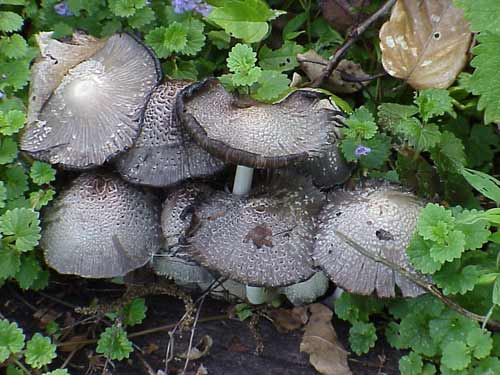
A patchwork of fungi.
(*Photo by Sally Ramsdell)
July 9, 2011 Checklist for
Reducing Stress in Threatening Times
Life
is not about waiting for the storm to pass; it is about dancing in the rain.
-- Sally Ramsdell's byline
All
life is mortal, and living contains its own inherent threats -- a stray bullet,
a cell-phoning driver in the other lane, a falling meteor, an unexpected
illness. While we live we are subject to barriers and situations that come in
the way of life, yet we should not let these hidden threats overwhelm us. It is
always wise to avoid known threats and take positive steps as a sign of our
respect for life. The following are found in this series:
Pray.
Share food with the poor.
Avoid alcohol beyond
moderation on occasion.
Avoid drugs -- only take
the legally prescribed one, and then in moderation;
totally avoid tobacco use.
Avoid financial
indebtedness -- if possible be free of debt.
Avoid driving too fast.
Get plenty of exercise --
the best stress reliever is a habit of daily physical exercise,
Eat nutritious meals.
Think positively on all
issues, even health ones.
Take fire prevention steps.
Activate a home alert
system.
Keep the mind active with
real puzzles.
Invest in local, civic and
social capital.
Keep car in good operating
shape.
Submit to regular physical
checkups.
Stay intellectually alive
and connected.
Get plenty of sleep.
Make an annual retreat.
Prayer:
Lord, help me keep this list, make it known to others,
and encourage them to
keep it as well.

Ladies' Tresses, Spiranthes diluvialis.
(*photo credit)July 10, 2011 Becoming
Efficient Sowers of Good News
Imagine a sower going
out to sow (Mt. 13:4)
Many
of us sow seeds and yet we "broadcast" in such a manner that the seeds are not
always fruitful. Our hopes are that the land accepts the seed and in the
natural process it gives a yield. On closer examination we find that we have
much to do with the productivity of the seed, and so the sower has to act
properly -- though this extends beyond the original parable.
Some
seed falls on the end of the communications path and the words get picked up by
bloggers and those who tweet bits of news, and so do absolutely nothing with
them. The poor with whom we work are simply forgotten in the noise of the
information blizzard all around us.
Other
seed falls on patches of rock, sprouts, and withered for lack of soil. This is
the affluent who are totally insensitive to the needs of others. These throw a
little sprig of charity at the poor, and pass on, for their material cares
consume their days.
Other
seed falls among the thorns, the cynics of the world around us. These people
ought to be able to make it fruitful, but their barbs and close connections with
similar friends choke out the message of good news and thus no progress can be
made.
Finally,
well placed seed falls among the sincere, those willing to sacrifice their
surplus so that all might be able to have the essentials of life. These are the
fruitful hearers, who in turn can replicate the message manyfold.
We
return to the sower, for the seed being sown is expensive and needs to be as
productive as possible. What we learn from the parable is that sowing has
different levels of production, and yet the last of the four is the fruitful
one. The attention of the sower must be focused on productive areas of the
arena of media and the public. Not all are willing to receive the message, and
extra effort at attempting to convince them could be fruitless.
The
extended parable means that we can be disappointed when we see our words
dismissed, overlooked, and even laughed at by the cynical. We must focus on the
good ground and thus have confidence that seed can be fruitful if sown among the
sincere poor. The message is that fruitfulness is possible; the challenge is to
hone the sowing to be directed to this target audience. Once the cynics or the
insensitive are identified, we ought to see that our efforts should not be
wasted in appeasing the twitterers and the affluent and the cynics.
Prayer:
Lord, make us good sowers of Good News, realizing who will truly receive the
word and focus our attention on them as much as possible.

Duskywing on coneflower.. Erynnis is a genus in the Skippers butterfly family.
(*photo by Sally Ramsdell)
|
In the Year of the Butterfly, we
dedicate the photos of this week to our loyal editor and photo
contributor of many years,
Sally Ramsdell. |
July 11, 2011 Let's Insist
on Free Access to Potable Water
Water conflicts are
harbingers of an accelerating disparity of wealth. Some demand the right to
water for essential purposes and some demand their water "rights." With
scarcity comes conflict when there are differences between those demanding
essentials and those demanding their "property" for affluent purposes. The best
preparation is knowing the conflict and understanding its full implications.
Infringement on water rights includes control of access, overuse of water
resources, and pollution of water quality. Control of quantity and quality of
water involves a number of agencies, and can become an involved issue; domestic
access to adequate potable water is limited, and so cooperative and political
actions at all levels from households to community water districts to
international agreements on limited water resources are needed.
For
the thirsty, taking urgently needed water has a prior right over those who have
control of water resource for profit making. Such taking is not stealing, for
essential needs come first -- not some legalistic property right. To fill a
swimming pool with potable water at low cost while others of lower income have
to pay for bottled water would be called a gross injustice -- but it happens in the world in
which we live.
We
must know what to do to help resolve water conflicts. Proper water distribution
demands systems for delivery of high-quality water to points of need with
minimal waste occurring. In theory, water is free; in practice, fees may be
charged for source maintenance and protection, delivery, apportionment, and
policing of end point use. Reclaiming our water commons involves taking:
*
Taking of needed water could be encouraged when the have-not is deemed
powerless. Will this reach levels of armed conflict?
* Taking those who
waste or pollute water to court is a growing possibility, as well as reporting
those who waste water to enforcement personnel. This includes taking nations
who dam water upstream and halt the free flow of water for traditional use by
downstream parties to world court.
*
Taking up the cause of people who would otherwise see their public water
supplies privatized with fees imposed where free water was formerly available is
to be supported.
*
Taking on "water rights" groups (generally agricultural users) to
renegotiate contracts, when essential needs of urban people are not being met,
may be needed with some changes in irrigation practices and use of cropland.
*
Taking on challenges of those who want to drain water for commercial
shipments to distant places and require license fees.
Prayer:
Lord, teach us to "take" gracefully for all who thirst for fresh and unpolluted
water.

Buckeye, Junonia coenia.
(*photo by Sally Ramsdell)July 12, 2011 It Is Time
to Expose Deadbeat Corporations
One
of the most disgusting aspects of the current exercise of governmental
belt-tightening is the omission of any restrictions for wealthy corporations and
individuals. Much attention is given to squeezing funds from WIC programs to
Pell summer grants, virtually all assisting the poor or lower income
individuals. All the while, the disparity of wealth keeps widening in this
country. This is more than cruel; this cries to heaven for God to hear.
Beating
up on the down-and-out is part of the insensitivity of an age of affluence in
which those not yet reaching such levels seem to be satisfied to aspire to be
rich some day, and so invest in the lottery. Many of us were enraged a little
while back when we heard that General Electric made over $12 billion (some say
$14 billion) in 2010 profits and paid no taxes -- and received $3.2 billion in
tax "relief." The success of their CEO who was appointed to the Obama think
tank for jobs creation was recognized when his income received an obscene 100%
increase for the year, a reward for dispersing influence properly. There are
many deadbeat corporations and the total evaded taxes may be to the tune of
hundreds of billions of dollars lost to the coffers of the rich each year.
Consider that the total tax havens of the global superrich contain about $14
trillion (equal to our national debt).
As long as such cruel
unfairness continues, one can expect a growing disrespect for the American
democratic process. If one is wealthy enough, with proper lobbying and excuses,
this person or corporation can get by without paying taxes and with nest eggs
coming to the door. Considering that the malnourished die by the millions each
year, many are getting away with murder when what could be given as essentials
are sequestered by the rich. A lesson from history is that patience can run
short and violence may very well ensue. Differences of such proportions when
suffering lower-income citizens dutifully pay taxes and endure high fuel prices.
A day of reckoning is coming.
Many
may say this topic is too incredible to believe. Our credibility is strained,
and leads us to think that reality is what is a dream. As our nation careens
towards financial bankruptcy and the debt limit is being exceeded, one fiction
is that if you allow the deadbeats to continue they will surely find a way out,
since they are good at pretending to have control of the situation. Their media
will back up their claims. Yes, there is an evil spirit at work in our world.
Fair taxes would be the perfect remedy for a nation that has financial ailments
of such a severe order, but the pressure to forego fair taxes is so very strong
that the democratic process itself is at stake. Who knows what the outcome will
be? Good will must be forthcoming, and true patriots must deliberately be of
service to the superrich by relieving them of their excess through fair
taxation.
Prayer:
Lord, teach us to see reality and to act accordingly with the proper, merciful
confrontation that is most needed now.

Pearl Crescent, Phyciodes tharos.
(*photo by Sally Ramsdell)July 13, 2011
Keeping Renewable Energy Decentralized
Approximately four acres of
parking space at the Cincinnati Zoological Gardens are now covered with solar
arrays. This is good because parking lots are wonderful places to gain solar
energy that will furnish one quarter of the Garden's energy needs. Many other
parking lots in this nation could recharge electric cars using solar energy.
The panels on a multitude of parking fields would not be perched on less
accessible roofs, even though that space is also excellent for solar purposes.
The philosophy for both wind and solar is to think renewable, think local, and
think convenient all at the same time. Wind farms deserve promotion especially
off the coast of the Northeast U.S. more populated areas. While larger scale,
they are regionally local and avoid shipping in fuel from halfway around the
world. However, wildlife experts are concerned about massive wind, and
especially solar, projects such as one in the Mojave Desert that threatens the
local tortoise.
Bloomberg New Energy
Finance (April 6, 2011) says that solar panels could rival coal-fueled
plants in the next two years. Coal- generated electricity is seven cents a
kilowatt hour; wind has already reached the seven-cents figure and is
declining. (See tomorrow for natural Gas at six cents, but new sources may have
problems). Decentralizing energy turns focus away from large centralized power
plants (the $8 billion nuclear monstrosities) and seeks to bring energy
production/consumption closer to home.
A
roof array of solar panels (like on the ASPI headquarters at Mt. Vernon,
Kentucky) means that the energy is produced on location even when tied into the
electric system, and does not require expanded electric transmission. Producing
energy even on renewable farms miles away leads to massive expansion of
rights-of-way and new transmission lines -- and inevitable transmission losses.
All of America's energy could be produced on those parking lots and roofs if we
put our minds and resources to it. Added to this is the bright prospect that
new roof coatings will bring down solar production costs dramatically -- by at
least half -- shortly.
We
hear much these days about natural gas being the energy of choice especially
with new-found sources (see tomorrow). However, this is a relative comparison
with coal-burning powerplants that contain many unseen problems due to safety
and hidden cancer-related problems. Using methane collected at landfills as
fuel is one global- warming-reduction procedure for escaping methane has 23
times the climate- change effect of a comparable amount of carbon dioxide.
Methane is an interim fuel while awaiting renewable and local energy sources.
Recall the potential for energy sources: small-scale hydro at existing dam
sites, wind turbines on the Great Plains, biofuels at forest, industrial and
agricultural waste sites, AND utilization of roof tops and parking lots for
recharging electric vehicles. Renewables need not be large farms.
Prayer:
Help us, Lord, to think more locally and with conservation of resources in mind.

Eastern Tiger Swallowtail, Papilio glaucus.
(*photo by Sally Ramsdell) July 14, 2011 The Jury is
Out on Marcellus and other Shale Gas
Natural
gas from shale formations is hot, very hot. Such deposits are found in many
parts of the world, including parts of 24 of our American states. The
potential, when compared to oil fields, is immense. We mentioned that landfill
methane (natural gas component) should not be allowed to escape, for it is 23
times more effective in global warming than carbon dioxide. However, while
shale gas is naturally contained, it could be released by hydraulic fracturing
or "fracking." The impact is where the jury is still out: How much will escape
in processing?
A The Washington Post
article (March 28, 2011) indicates that Maryland sits on a huge gas field
(Marcellus Shale) and is debating the environmental implications. Years ago, we
thought shale fuel was dead here in Appalachia, since digging up the rock and
procuring the oil product would take more energy than the final fuel content.
However, leaving shale rock materials within the soil and extracting the gas
does constitute another consideration. More information is needed since the
process is less impacting.
Several
facts need to be established for a wise decision on promoting shale gas
utilization. Cornell University researchers write in the journal, Climate
Change, that fracking for gas contributes as much, or even more to global
warming, than does coal, because some amount of methane escapes unutilized.
Currently coal costs seven cents a kilowatt hour and rising, while natural gas
is six cents and falling. All are aware of pollution, safety, and land
disturbance effects from burning coal. Wind and geothermal energy are now
competing with coal, and solar will be in about three years. The injected
fracking materials (benzene and radon) should be made known and not kept as
company secrets. We do not know whether these materials will remain in the
shale layers or possibly escape into groundwater. We do know that coal-mine
blasting fractures aquifers very near the surface. While waste water from
various processes (coal-washing, gas-drilling, etc.) can be controlled,
pollution by these wastes has proved bothersome in many mining regions.
Without
better knowledge of the extracting process we are currently unable to make a
complete environmental judgment. Prudence requires that we go slow when it
comes to new energy sources, and especially those involved with burning fossil
fuels; the past record has not been perfect. Kentucky has two shale gas
fields, but competing coal companies will attempt to keep this gas extraction
from being actualized. Thus we count on non-fossil-fuel-producing states such
as Maryland to research this new-found energy source with its potential
environmental impacts. Pennsylvania sits in the middle of this vast Marcellus
field, covering half the state's surface area. By going slowly, New York and
Maryland are showing responsibility.
Prayer:
Lord, teach our people to go slowly enough to weigh all issues with care,
thinking more widely than the profit margin.

The Red Spotted Purple, Limenitis arthemis.
(*photo by Sally Ramsdell)
July 15, 2011
Recognizing the Need to Count Important Matters
|
Today's Daily Reflection is
dedicated to Sally Ramsdell,
who particularly likes this text. |
Teach us to count how few
days we have and so gain wisdom of heart. (Psalm 90:12)
Interestingly
enough, the inspired psalmist understood so many centuries ago that limited days
could indicate the need for a wisdom stemming from "counting." Quantitative
measures do have a meaning in life and ought not be discounted by non-counters.
Jim Vizzard, a Jesuit activist of the mid-twentieth century, used to say one
needs to make a retreat, "I'm not God, You're not God," and accept the spiritual
results. In other words the above title recognizes that subject in quantitative
terms and, being human, we ought to have some feel for quantities. In part,
that is because, with each day, life span is shortening and our ebbing energy
can almost be measured. Youth may think of spans and resources as limitless but
that is not true -- our span is measurable, even if we are not sure of the exact
number at this moment.
Knowing
ourselves means that we cannot continue to do the exerting things (jogging,
skiing, partying, excessive driving, etc.) that we were so proud of and could be
counted when younger. None of this counting was wrong, and had a goal of
competing against oneself. Wisdom could result from less such physical
exertions, and yet there are spiritual frontiers even when material resources
lag. The object of aging is to see advantages in taking on areas of spiritual
motivation, and to recognize them early so as to gain "wisdom of heart," a
virtue lacking today.
Wisdom
is needed in our lives for ever so many reasons: to pace ourselves in the work
we plan, the vacations we intend, the gifts we give, and the time we tweet; to
let others know that they are exceeding their own limits and that resulting
stress will only hurt them; to tell policy-makers that their expectations are
most likely unrealistic and that drive them further from reality in planning for
the local, state and national future practices; and to not get stressed
ourselves when we conclude that certain plans will not now, or perhaps never, be
reached in our lifetime.
The
need for wisdom is better seen when we have only a few days left. Others may
wait to take up matters later since they feel (falsely) that they have plenty of
time. However, we are like team members with only seconds remaining in the game
of life, so let's make every second count. Each day calls for a more perfect
performance. Our prayer must be a resolve to do the best we can, and yet admit
it is not a perfect success. Our fidelity is what counts now and always -- not
some unrealistic measure of success. While we learn to count our days, let's
challenge all -- including ourselves -- who count wrong things: books, perks,
wealth, cars, house-size, friends, press mentions, invitations, Facebook
entries, etc. It is enough just to count the few days left even when we don't
know how many there are.
Prayer:
Lord, allow me to repeat the above quotation: Teach us to count how few days
we have and so gain wisdom of heart.

Savoring the mallow.
(*photo by Sally Ramsdell)
July 16, 2011 Suggestions
for Improving Annual Retreats
Virtually
all these reflections are written months in advance, and so what I experience on
the day this is published may be different. So be it! If all life goes as
planned -- and it doesn't -- I will be finishing my annual retreat today in
preparation for weekend liturgies. During this annual event, I always find
areas for improvement in personal life and in retreats themselves. Since this
is an encounter with God, individual moments must be respected for all. My
conclusions cannot be predicted but these suggestions will be honored:
1.
Set a place and time. Though other things come in the way, on occasion,
setting this makes annual retreats possible and not delayed to tomorrow.
2.
Abstain from external matters. Enter the event with a resolution not to
do external business matters during the retreat span. The only exception is the
spiritual duties of religious observances, which is part of ordinary life.
Leave unrelated reading material at home.
3.
Isolation is needed. Consider a cut-off from the rest of the world. Tell
associates and loved one where you will be and that disturbance will only be in
the most extreme cases. Daily connectedness should be deferred in order to be
with God.
4.
Goals may be burdensome. Sometimes we need to answer a specific
question, and that is a goal but not the conclusion. Leave answers to the
movement of the Spirit.
5.
Limited conveniences are helpful. This does not mean to seek the lap of
comfort. In fact, differences in daily routine can intensify a sense of
gratitude for gifts given. However, curbing sleep or fasting may prove too
distracting. Some require more comfortable retreat house settings than do
others.
6.
Silence is golden. Some retreats are preached and should not be
dismissed -- if one is moved to make this variety. I prefer a silent retreat
away from phones and Internet.
7.
Keep a record if so moved. I must confess to never looking again at most
of them, though recording is part of my retreats.
8.
Enjoy the outdoors. It is important to see that God speaks to us in the
beauty of nature and among the wildlife around us. We need to be open to the
moments of such conversation.
9. Travel light
rather than with excess baggage. Take comfortable clothing and personal items
but leave extras at home.
10.
Prepare to arrive at a resolution.
Prayers:
Lord, give me the grace to make a good retreat.

The Giant Swallowtail, Papilio cresphontes.
(*photo by Sally Ramsdell)
July 17, 2011
Tolerating Weeds amid the Wheat
Let them grow
together (Mt. 13: 24-30)
People
respond differently to the presence of weeds; some are almost violent in getting
rid of them immediately; others are tolerant, trying the patience of the
tidy-types; others have more important things to do. We all may react
differently if the weeds were deliberately sown, or if we actually see a
disruptive person sowing weeds. What if weeds are not material things so much,
but rather human attitudes that change their everyday practice? What if weeds
are GREED? Again and again, we observe what the greedy have gained, and know
greed has already been sown -- and is being sown at this very time.
The greedy are in our midst,
and this is a problem (see the reflection July 20, 2008, "Weeds, Tolerance and
Permissiveness"). There are two problems with greedy weeds -- how to handle the
greed that is operative today, and how to stop the greedy from perpetrating new
acts. One dramatic way of conquering greed is to kill the greedy. However,
this Pol-Pot- Cambodian approach would ultimately eliminate all people, for none
of us is perfect -- and really, would a depopulated Earth solve the problem of
greed or any fault for that matter? Uprooting is not ours to do, for the
greedy will be punished some day by the hand of God. However, we can restrict
the effects of current greed on society.
Greed
as "weeds" shows itself in attention to accumulating luxuries when essential
needs by the poor go unfulfilled. In what way should we "tolerate" the misspent
luxuries in our midst, while five thousand kids die each day from lack of proper
nutrition to ward off opportunistic diseases? Let's make the greedy aware of
the unfair nature of their practices. To what extent must we have forbearance
and be patient with our fellow human beings, even when they are overly greedy?
We can certainly point out greed and show it is the opposite of selflessness and
love; we can take steps to teach others the limits of greed and how they must
avoid such practices; and we can challenge a system that treats greed as a
virtue and actually promotes it.
Should
we allow current sowers of greed to go unchallenged? Greedy ways are being
championed today in a society bent on material profit motivation. We can point
these out and challenge the sowers of greed. Silence and permissiveness are not
proper forms of tolerance when we seek to halt the act of sowing. We can
control situations that stop the greedy from sowing more. We can safeguard the
innocent in the wheat fields and do so with determination, but this goes beyond
the parable. We can say "no" to certain "weedy" acts that hurt others, and know
when these must be resisted forcefully.
Prayer: Lord, make
us worthy to challenge the greed of our world through your Bread of Life.
Though we are imperfect, make us worthy to confront evil boldly, and be willing
to contest it properly, all the while showing mercy to those who are greedy.

The Red Admiral, Vanessa atalanta.
(*photo by Sally Ramsdell)
July 18, 2011
Space Week and Militarization: Another Problem?
During
Space Week we notice how wide open spaces seem so attractive, whether
vast stretches of land in the West or outer space amid the twinkling stars.
Young people are attracted to space probes, vehicles, and future travel.
However, space programs are expensive, and it takes constant media hype to keep
such programs funded in these tight financial times. The added problem is
whether there is a military component of space programs -- and we know that our
military budgets are out-of-hand.
Space was never far removed
from warfare from cannonades to hurling missiles. Napoleon in the early
nineteenth century, and later Civil War generals, sent up hot air balloons for
observation; World War One had airplanes for observation what later served as
carriers of bombs. The Second World War graduated quickly from Blitzkrieg to
massive air raids, to V-3 rockets -- making Libyan no-fly zones almost seem
child's play. Star-wars-type fiction was all present in twentieth-century
books and films, and still in the past half century there could be some truth to
it. Space missiles were placed in silos ready to destroy another super power in
a matter of minutes. In 1957, the USSR placed Sputnik I into orbit and
this shook our country to its core. The space race dealt more with satellites
and exploration, but wasn't there an underlying military purpose? Spy
satellites have now been so perfected that they can distinguish garden
vegetables anywhere on Earth -- at least that's the boast.
President
Reagan's "Strategic Defense Initiative" became an acceleration of space
militarization. The Soviets followed with their own programs. However, through
the 1987 Salt II Treaty neither super power was to place nuclear weapons or any
other kind of weapon of mass destruction into Earth orbit. With the demise of
the Soviet Union the space contest seemed to halt for a time. However, is this
really true? What about the hidden technical work of allies or potential
enemies?
A
Christian Science Monitor article last year (October 28, 2010) was
entitled "China Is on Path to 'Militarization of Space'." The article actually
described how the Chinese wanted to send a space craft that could have a low
orbit around the moon to do photographic work for a lunar landing site. This
work is under the People's Liberation Army; there is speculation as to whether
this program is directed at knocking out US satellites in the opening hours of a
Taiwan crisis. Space has been used for communications systems from CPS to all
forms of space exploration and research laboratories under the joint cooperation
of various nations. Space does not currently have a high priority in American
budget considerations, but would a scare by the Chinese launch a second space
race? This question remains unanswered.
Prayer:
Lord, give us light to see the space commons as a global concern and in need of
respect by all people.

Great Spangled Fritillary, Speyeria cybele.
(*photo by Sally Ramsdell)
July 19, 2011 The Elite
Versus the People
Elitism
grows from different sources: the ones who think they are elite; the ones who
honor those who think they are elite; and the ones who demand an elite class.
However, the need for elitism does not exist in every culture, only in those
that have an exaggerated sense of individualism. When societies demand the
elite, they seem to spring forth, but ought they? Is this the last vestige of
an anti-democratic spirit?
The
elite individual stands sharply in contrast to the democratic citizen, a person
who is one of many. The elite is a specially privileged person through some
at-least-temporarily- acceptable classification: blood line, wealth, power,
fame, academic degrees, or intellectual acumen. From the Republic's beginning,
some misguided people sought to make George Washington an elite king by reason
of his military exploits. Plutocrats arose early in commerce; they soon gained
notice in the young republic -- and never left. Today, elitism appears in many
ways: membership in exclusive clubs; places of honor or recognition at events;
mention in press and other media; the curriculum vitae as a means to
recognition and employment; notable places of residence or brands of vehicles
used; and declaration of some as authorities.
Elitism
becomes undemocratic when the voices of common folks are relegated to a lower
rank than those of the elite. Should voice be based on the loudest or the most
sonorous or erudite? Failure to hear over the clamor of too many voices can be
difficult. So is failure to tax the wealthy elite fairly, for fear that they
may lose their ability to create jobs. Placing the theoretical judgment over
the practical is a form of elitism; they must be in balance. Disarming elitism
is often the task of humorists: the bar drunk ought to be quizzed at the end of
the year along with the greatest economist regarding the possibilities of the
coming year;. The final predictions will most likely be even in their
accuracy.
Yes, we need experts, but we
do not need elitists. Experts are a little ahead of others in time, though not
in space. Others follow because that is the natural course, not because the
leader is elite. On the other hand, the elite stand out not in leadership but
as different from the multitudes, and thus seek special status. Elites are thus
by nature anti-democratic. The reason for their existence is that the public
allows their royalist tendencies to find and celebrate celebrities; people want
elites because they desire outstanding individuality. The battle over a title
for the president was resolved democratically in "Mister" President. Few recall
that the first American Catholic bishop, John Carroll, suggested that his title
be "Mister Bishop."
Prayer:
Lord, give us a sense of knowing the scourge of elitism, and help us to imitate
Jesus who washed the feet of the Apostles, and asks all of us to serve others
similarly.
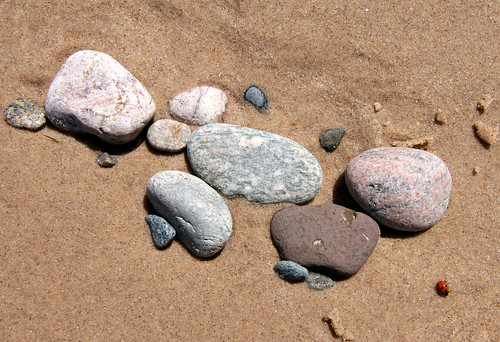
Vivid colors along Lake Superior, Michigan.
(*photo credit)
July 20, 2011 Tackling the
Overpopulation of Cattle
For
a person who chose a bovine spirit creature, one would expect this author to
talk much about his many years of feeding, milking, and herding cattle.
Actually only herding is found in these essays -- and part of this silence is
related to ambivalence. While I like cows and calves and grazing herds, still
we must face the fact that we place too much emphasis on cattle as food source
(beef and milk). A 2006 report by the United Nations estimated the world's
cattle population at 1.5 billion, or one for every four humans. However, cattle
mature far faster than humans, and possibly will experience higher population
growth in coming years as more of the world consumers choose burgers and milk
shakes.
Grain
utilized directly for human consumption is far more efficiently used than grain
converted to animal feed first -- and then for animal products. Direct
consumption should include the grain now utilized in biofuel production (40% of
U.S. corn production total in 2011). The farming lobby will hasten to say the
leftovers after ethanol go into animal feed -- and that is true. However, as
food prices rise dramatically throughout the world, decisions in one major grain
producing nation affect other lands as well. All of us could cut beef
consumption allowing more feed grain to be used for human consumption. It is
easier to ship grain to another country than to ship cattle or beef products.
Furthermore, forests are being decimated as they are converted to pastureland
for profitable cattle-raising.
Cattle
raising also has an impact on climate change. Cattle produce methane, a
powerful greenhouse gas. Beef production is responsible for 18% of the methane
production in the U.S. (recall the effects as mentioned the last two days).
Milk production is a concern as well, though milk production may be regarded as
more justifiable than beef from a health and environmental standpoint.
Nevertheless, milk cows produce methane also. I can recall blasts of flatulence
from our milk cows that sent manure jetting forth, smashing into milk parlor
walls eight feet away. Animal milk production is still popular; however, let's
consider soy milk.
Another
approach that could reduce cattle methane production by up to 30% is to change
the animal feed. A Union of Concerned Scientists report, Raising the Steaks:
global Warming and Pasture-Raised Beef Production in the United States,
speaks of pastures planted in birdsfoot trefoil (a legume that enriches soil as
well) as one such feed change. However, do you expect farmers with bottom-line
problems to be concerned with reducing animal methane. Additionally, the U.S.
Agriculture Department may not be willing to furnish financial incentives and
technical assistance in this time of budget reductions. Far better is to
promote soyburgers and eating whole grains along with fruit, nuts, and veggies
-- requiring little methane generation. How about persuading meat eaters to
consider buffalo burgers instead of beef (see July 7th)?
Prayer: Lord, teach us to
eat nutritiously and yet resourcefully.

Murky creek. Anderson Co., Kentucky.
(*photo credit)
July 21, 2011 First Bull
Run: Reflecting on Civil War Issues
Today
is the 150th anniversary of that first great Civil War battles in northern
Virginia. Two inexperienced armies clashed, blood flowed and would not cease
until 620,000 soldiers and others had lost their lives in four years. Those of
us who reside in border states ask ourselves the never-to-be-answered question:
what side would I have fought on? When younger and romanticizing history, the
side of the underdog, states rights and confederate revolution sounded good to
me; I might have decided for the Confederacy. However, when I considered the
unspoken slavery issue and the need to preserve the Union, I might have been
inclined for the Union. For Kentuckians, decisions were difficult and
neutrality seemed proper.
The
South had an immense appeal. I was born two miles from the birthplace of
one of the South's five full Confederate generals, Albert Sidney Johnston, who
was nearly victorious at the Battle of Shiloh, and through a gunshot wound bled
to death without getting attended. He was one of 11,000 Confederate and 13,000
Union casualties in this indecisive slaughter in Tennessee in early April,
1862. The glamour of the South during the early part of the war attracted me.
Also, since our farm was part of the former estate of a Revolutionary War
veteran, General Henry Lee, I was an admirer of Robert E. Lee, his distant
relative. I suspect I read virtually every popular book on the Civil War and
southern veterans of that war. However, I lost my interest in Lee late in life
when I visited his tomb at Washington and Lee College in Virginia and saw black
and red banners that reminded me of Nazi symbols.
The
North would have been more to my personal tastes had I been born a century
before; it would have been in my twenties when that unfortunate event
occurred. Only my maternal ancestors were in America at the time, and in photos
of my great grandfather and his nine brothers two have Union uniforms on (they
lived in Appalachian southeast Ohio). The sentiment in my part of Kentucky was
certainly divided, but the John Hunt Morgan raids did bend the county towards
the Union (though the people utterly despised federal military rule of Kentucky
during the war).
In
hindsight, we were blessed by not having to make choices regarding which side to
fight for in 1861-65. Most likely our family would have been split (see The
Brothers War on this website about neighbor Joe Davis). Current struggles
should take us from the hypothetical yesteryear to the not-yet-realized
tomorrow. Many have strong political, economic, and social opinions on national
and global issues, just as decision were made a hundred and fifty years ago.
Where do we stand on the disparity of wealth in this world? How can we reclaim
the commons? Can we obtain universal health care? There are Civil War-type
issue before all of us.
Prayer:
Lord, teach us to discern the Spirit in matters of immense importance in
saving the union of our human family.

Solar panels at Appalachia - Science in the Public Interest.
(*photo credit)
July 22, 20111
Thunder and Lightning: Taking Proper Precautions
Thunder
frightens people and pets; however, it is not the thunder but the accompanying
lightning that should concern us. Any person living in Kentucky knows how
severe these storms can be. My mother would light a holy candle when the storms
commenced. Thunder signals CAUTION; lightning presents the power of an electric
bolt. Yes, lightning strikes are rare, but can cause more deaths and injuries
(about 400 in America annually) than the chance to win a major jackpot. Yes,
lightning does strike twice in the same place. Yes, trees are not good
protection from lightning storms. A former reflection (February 9, 2006)
touched on lightning, but more proper precautions are worth mentioning now.
Stormy
Weather
* Observe the weather.
Listen to news broadcasts. Some radios are triggered to tune in to local weather
bulletins. Take advice given for the protection of people and property.
*
Get indoors away from the storms. Stay out from under trees. A car is a
safe place as well, provided no trees will fall on it during the storm.
* Unplug computer cords
and other electronic devices. Remember to do so when leaving the home or
office during these stormy seasons. I take the added precaution of placing
updated working files in another room of the house in case lightning strikes. A
friend lost much of his doctoral thesis by such a strike. Another friend had
his television studio damaged by lightning twice. Longer-term files ought to be
stored in a distant place in case the building is struck and burns down.
Longer-Term Cautions
*
Plan new buildings with care. Due to respect for the power and propensity
of lightning, I once suggested that an Appalachian group build their new guest
house further down the slope away from potential lightning strikes; they ignored
the recommendation, built the building there anyway, and a guest was killed a
few years later at that spot by lightning.
*
Install lightning rods on isolated buildings, especially when located on
high places. My earliest recollections include the installing of lightning rods
-- a major Great Depression investment-- on our farm buildings. Our family's
tobacco barn was at the highest part of Mason County and the rods saved it
during one lightning strike. The strike traveled down the rods splitting siding
near the ground due to a loose connection -- but no fire.
* Teach youngsters to take
precautions but not to be excessively fearful, for lightning is natural and
severe storms in this part of America must be endured.
Prayer:
Lord, teach us to respect nature, and give us protection from the storms of
life.
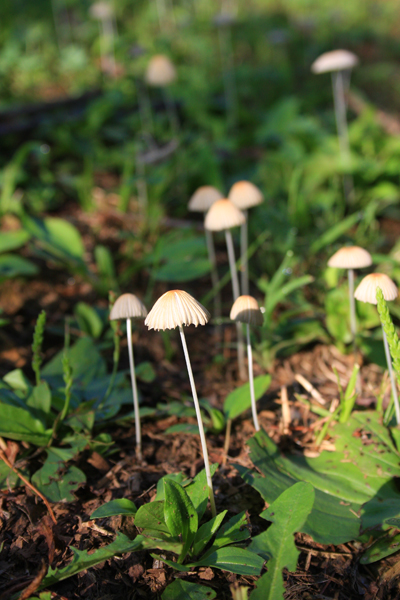
Unidentified "forest" of fungi.
(*photo credit) July 23, 2011 A Problem of
the Commons: Resistance to Antibiotics
There
is the danger that the ignorant man may easily underdose himself and by exposing
his microbes to non-lethal quantities of the drug make them resistant.
Alexander Fleming,
developer of Penicillin
What
Fleming predicted a half century ago at his Nobel Prize reception is
unfortunately coming true. In a special feature on "The Spread of Superbugs,
The Economist (April 2, 2011) pp. 73-75, reasons for this growing resistance
were given as convenience, laziness, perverse financial incentives, and sheer
bad luck. James Hughes of Emory University says that about 50% of antibiotic
use is unnecessary or inappropriate. Misuse in a variety of ways contributes to
the advance of resistance and yet at any given incident the doctor considers
this current patient, not future global problems. For example, antibiotics are
used against bacteria, not viruses, and yet patients press doctors to prescribe
them for viral common colds. Self-indulgence makes one a breeding grounds for
resistant bacteria.
Poor
countries use more and more cheaper drugs, and resistance grows. In many ways,
the overuse of antibiotics developed over time, with no major concern by
prescribing doctors or patient pressure. However, the greatest use (80%) and
misuse of antibiotics is in livestock operations, where perfectly healthy
animals are dosed with antibiotics as an incentive for faster growth and cheaper
meat product, resulting in the evolution of the resistant superbug in livestock
raising.
Tuberculosis
used to kill millions and numbers were reduced to tens of thousands through use
of antibiotics. However, victory is not total; resistant strains of bacteria
are occurring that require treatment with stronger and more costly antibiotics.
One additional problem is that there is little incentive among major
pharmaceutical companies to invest in stronger antibiotics. Many of the
resistance problems are more concentrated in poorer nations that could not
afford costly alternative drug treatments. Furthermore, profit margins are less
for some antibiotics, because few doses, not numerous ones, are generally
sufficient for a cure. Smaller companies are doing research, however, though
complications constantly arise among patients being treated. The Infectious
Disease Society of America proposes offering tax credits, guaranteed
markets, and prizes for new antibiotic development.
Amazingly,
the tragedy of the commons stands out in this health issue; gains from overdose
of antibiotics are private, whereas losses are public. It is similar to
enclosing common lands, polluting fresh air, privatizing water supplies, or
capturing the Internet. What the commons demands is respect and a strong civic
and social sense for the benefit of all.
Prayer:
Lord, teach us to use all things well; help us see that the great medical
weapon, antibiotics, can be easily misused.

Leaves of the green dragon, Arisaema dracontium, native Kentucky
wildflower.
(*photo credit)
July 24, 2011 Invest in
the Treasure of Spiritual Motivation
The
kingdom of heaven is like the head of a household who brings from the storeroom
both the new and the old. (Mt. 13:52)
Two-thousand-and-thirty
Daily Reflections, and none titled "invest" or variants on that word! True,
material investment is not my forte, and one who wishes to invest can choose
from a slew of financial consultants for expert advice. We can not judge
another's investment decisions, if he or she earnestly wants to prepare for old
age or a dependent's education. However, for those who consider capitalism an
abomination, investment could be directed to land for growing crops, alternative
non-monetary communities, residential property, small businesses or crafts, and
expertise for realizing income in senior days. Money is not the only material
investment but is needed for college/hospital bills.
Advancing from material
concerns to spiritual ones does involve investment as Jesus often teaches us --
a preparation of storage of spiritual goods and practices. Jesus offers an
entirely new order of motivation, a spiritual option that goes far beyond
material gain. We discussed how material security is an illusion (August 1,
2010), because spacious homes crumble, fields erode, and expensive vehicles need
servicing. The span between needed "treasure" to meet material obligations and
moving into areas of excessive and foolish material concerns is narrow and can
easily be crossed over. In the examples from today's Gospel passage, the use of
wisdom in one's choice of material investments need to be extended and focused
upon spiritual ones.
Spiritual
investments involve focusing first on God's work and then directing our energy
to the performance of required duties. Hurdles arise but we remain confident
that God will see us through difficulties. Spiritual concern looks beyond the
self to a wider audience of needy people. When we invest our attention and
concern in others who are less fortunate, we gain a perspective that allows us
to confront our own difficulties with less stress and tension; we become
sensitive to the needs of those who have less than we do.
Our spiritual motivation
takes on two fronts: individual conduct in family responsibilities and
the welfare of neighbors in need; and a social responsibility that
strives to change the political and economic system of a selfish society that
overlooks those who have less voice in policy-making. We seek to confront
materialism by pressing for the removal of excessive gains of those affluent
people who are obliged to share their excessive resources. We must go a step
farther, and promote the truth that riches do not belong to the wealthy but to
the human family, and excessive hoarding is destructive in our society.
Challenge youth on the road to material success to see the futility of the false
promises of excessive profit motivation.
Prayer:
Lord, allow us to focus attention on spiritual motivation, and to see greed's
shallowness in all its forms.

Grapevine beetle, Pelidnota punctata.
(*photo credit)
July 25, 2011 "Food Day"
in October Should Focus on Food Costs
I promised my long-time,
public-interest colleague at CSPI, Mike Jacobson, that we would promote his
upcoming "Food Day" that will occur on October 24. Time is short, and we ought
not put off the preparations. Food celebrations in any form take time and
planning. This is not a new idea; when I was still a co-director of CSPI in
1973, we introduced the first "Food Day," which received considerable
publicity. Perhaps some of you readers were not around 38 years ago; however,
the ideas that inspired that first event are still relevant -- food safety
awareness, good food advertising, locally-grown foods, and proper nutrition.
However, we have an added reason that makes this Food Day imperative, namely
food costs for lower-income people.
Believe
me, food costs are like gasoline, and price increases hurt those of us who
strive to live on low-income budgets even during the garden-productive month of
July. Food costs more than last year, and tightened budgets affect food
choices, food safety, and food nutrition. Make food costs the center of the
issue and design Food Day celebrations to focus on the most essential concern of
the human race. Sufficient food is the concern of one-in-five people, who live
with over half their income devoted to food -- and still going to bed hungry
quite often. Satisfying basic food needs require local, national, and global
attention:
*
Restore food assistance money to budget-cutting both in this country and in
foreign aid areas;
* Expand global food storage
centers and provide subsidies to small farmers in food-insecure places for
tools, seeds, fertilizers, and building market routes and storage facilities;
* Stop subsidies to biofuel
ethanol production and send the saved grain to expanded overseas storage
facilities for use in times of drought. Some 15% of the world's corn supply and
40% of the American crop this year is being converted to biofuels;
*
Promote unprocessed food and whole grains;
* Cut food stamps for soft
drinks in ALL states;
* Restore WIC funding and
commodities distribution;
*
Develop and publicize innovative ways for the poor to have greater variety in
soups, salads and breakfasts, and still eat nutritious food at all times; and
* Tax the rich for God's
sake -- and for the hungry.
Prayer:
Lord, help us to focus attention on freeing the hungry in America and elsewhere
from food insecurity and make this the primary Food Day goal.

Elegant bloom of the corn plant.
(*photo credit)
July 26, 2011
Hunger Must Be Eliminated Now
The
reason hunger is not being tackled right now is because you and I, and much of
the literate world, are not hungry. Additionally, the ones who are hungry now
have no power to press their point. We ought to recall that at the turn of this
century the goal of eradicating hunger seemed feasible to global relief agencies
and UN officials. There was hope to reduce the 750 million to 375 million by
2015 and then continue further reductions. Today the total hungry verge on one
billion and perhaps will increase with higher food prices and foods shortages.
Tackling
world hunger has new challenges. This year about 15% of the world's corn is
expected to be used to make biofuels for vehicles -- many of which lack good
fuel efficiency. The hungry cry to heaven and so every effort must be made to
prepare foods that have low cost. Many plants can be used as soups and could be
mixed with basic soy and whole grains -- creating palatable and nutritious
dishes (see 365 Soups in the Special Issues of this website).
Furthermore, more efforts must be taken to convert edible products into readily
available foods that do not require cooking or mixing with possibly contaminated
water.
One low-cost approach is to
create a prepared "wonder food" that does not require cooking, can be
distributed easily, is low-cost, and is fast-acting among very hungry people.
Such a product is made by a French company (Nutriset) and is called
Plumpy'Nut -- a material that has the sponsorship of UNESCO. A single
packet costs as little as six cents. This superfood is a mix of peanut butter,
vegetable oils, powdered milk, sugar, vitamins, and minerals. The ready-to-use
therapeutic food is highly acceptable by all including hungry children who
suffer from malnutrition, and are at the point of being susceptible to
opportunistic diseases. Some call Plumpy'Nut a miracle food and compare it to
penicillin. Furthermore, this food does not require trained health personnel to
administer.
While
such foods do exist for rapid recovery from malnutrition, it must reach these
unfortunate people before it is too late. UNICEF estimates that 4 to 5 million
young children under the age of five die each year from an inadequate diet.
Often, children do not get adequate diets because mothers, who bear much of the
physical work load, are malnourished themselves, and cannot provide adequately
for their offspring. To reach clinics many have to walk great distances and
stand in line for hours for treatment. An additional reason that Plumpy'Nut or
equivalents are needed is that milk, so cherished by the malnourished, is often
expensive, and there is scarce refrigeration to preserve this precious
commodity.
Prayer:
Lord, forgive us for burning the materials that could feed a hungry world in the
vast fleet of private automobiles.

Eastern box turtle, Terrapene carolina.
(*photo credit)
July 27, 2011 Benefits
from Redistribution through Fair Taxes
The
mantra of "No New Taxes" is the best piece of propaganda ever perpetrated by the
superrich; these people influence the media and those who spout the message to
realize that "no new taxes" is different from "only fair taxes." We hear and
read the horrors of the overtaxed but never hear about the disparity of wealth
between them and the undertaxed who need to meet a fair tax assessment.
Benefits that could accrue from fair taxes are:
*
Tensions would be allayed through a reduction in the disparity in wealth;
* Worldwide hunger and lack
of potable water could be reduced through subsidizing small farmers to assist in
agricultural expenses associated with local food production and improvement of
local water systems;
* The Global Development
Fund and other United Nations programs would have the revenues from fair taxes
for their expanding agenda;
*
A global public housing program would employ thousands of workers, require use
of local building materials, and add money to the local economies;
* Reduced military
expenditures would shift more problem resolution to diplomatic and financial
activities, and the military personnel to peacemaking duties;
*
Terrorism would be reduced along with the security measures now existing to
counter terrorist assaults;
*
Enhanced democracy would occur through direct election of candidates as well as
limits on campaign spending;
*
Renewable energy alternatives would be promoted;
*
Employment would increase with attention given to improvement of infrastructures
(roadways, irrigation, high speed railways, park areas, and food and water
treatment systems;
*
Health and educational facilities and programs would be expanded to cover basic
needs of all people; and
* Motivation would be
purified to where profit motive becomes a spiritual and not a material goal.
Current
financial conditions reflect a Monopoly game in which one owns all the
hotels and the rest hope for the luck to avoid landing on one of these rental
properties.
Prayer:
Lord, help us to discover the spiritual power to assist those in need to take
what is rightfully theirs.
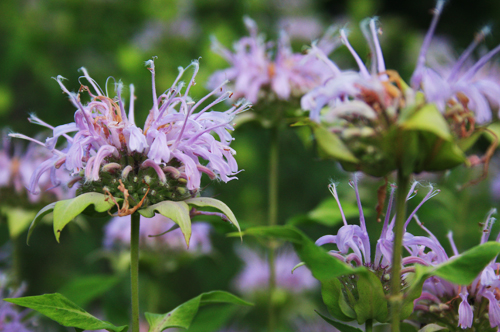
Wild bergamot, Monarda fistulosa, mint family. Leaves used by some in
tea.
(*photo credit)
July 28, 2011
Summer Drinks Revisited
There
is more to making summer tolerable (see July 5th) than just increasing liquid
intake. However, we need some further reflection on which liquids to focus our
attention.
Water
is the primary summer liquid worth recommending. It can be iced when needed,
and a lemon slice added for flavor. In cooler times, warm beverages compete
well, but we all need steady replenishment of good quality water. However, some
do not like the taste of their municipal water and can't always afford bottled
water, nor ought they choose this option, for all drinking water ought to be
free.
Soft
drinks are summer favorites with many, especially youngsters who are quite
active and thirsty. Soft drinks are expensive, even with what appear to be
frequent sales at lower prices. Habitual soft drink consumers acquire health
problems and gain excessive weight. Commerce, enhanced by catchy advertisements
and ubiquitous coke machines, make these items into multi-billion-dollar sales
items here and abroad. Soft drinks are generally carbonated, contain massive
amounts of sugar, and are dyed by substances over which the health jury is still
out. Once the soft drink industry overwhelmed small local producers, container
problems resulted, because it was uneconomical for the big corporations to deal
with returnables -- as they did with our weekly soft drink treats in the
mid-twentieth century. The main cost is the one-way shipping. Returnables cost
time, effort and terminals for collection. A major container disposal problem
arose, for not all containers are recycled.
Herbal
drinks are a favorite of the economic- and nutrition-minded. These need not
be heavily sweetened, but may contain herbal sweeteners. I suggest home-grown
mint steeped as sun tea; this can be supplemented with a dash of lemon juice and
sweetener as desired. Herbal drinks often lack added chemicals and carbonation,
cost virtually nothing, and quench thirst quite well.
Traditional
beverages still have their place -- coffee and tea can be iced. The use of
coffee has many health advantages; besides keeping drivers awake, heavy coffee
drinkers experience lower prostate cancer rates. Keep sipping in summer.
Harder
drinks have their place in special celebrations, but alcohol is to be
avoided in summer's heat. Even beer, that summer drink of baseball fans, has
its place in moderation. Alcohol levels can slips up on us, especially when
driving. Plan ahead as to when the next driving episode is to occur.
Prayer:
Lord, you are the fountain of living water. Make us treasure you and the
water as well.

Friends meet through glass door.
(*photo credit)
July 29, 2011 Reclaiming
the Commons: A Simple Formula
The
readers edition of "Reclaiming the Commons" is now available through Brassica
Books. This book addresses the commons associated with air, water, land,
culture, health access, education, communications, intellectual materials,
silent space, commerce, and movement of people.
The seemingly complex
problems of relinquishment and enclosure, along with a plethora of groups
attempting to bring about local, regional, national and global equality can
obscure the issues. This is true if the basic solution is not kept clearly in
mind. Many methods from community food access to literacy training all
contribute to the reclamation process, but only contribute as part of a
cooperative and global effort. To become too entangled in the minutiae of
details may miss the point that all need to help contribute each in his or her
own way. This struggle is a revolution of the lowly taking what is rightly
theirs, and not a gift from the privileged. To do this will require
participation in the democratic process, which has been compromised at times,
but is still basically intact.
The
problem is centered not on intellectual assent to a complex rational process,
but requires the willingness to assert ownership in the name of the many. This
"many" is often erroneously understood as left wing, secular, violent, or
disruptive. Such images are the result of media controlled by the status quo
and its desire to keep existing systems of power in place, and continue harm to
our Earth and human democratic communities. The lowly can rise but this
requires leadership by agents of change. The formula is simple:
Fair
taxes involve everyone including the rich; tithe the tax havens -- 10% per year
until these funds have been reapportioned.
A
simple fact emerges: the disparity of wealth is the source of the greatest
terror in our world. It causes luxurious expenditures by the privileged instead
of essentials for those in need; it rejects the power of democratic processes to
work equally; it fosters a false incentive on the part of people aspiring to be
better to try to imitate the wealthy in acquiring spacious homes, exotic travel,
resource-intensive food, and devices that consume electricity; it leads to
global insecurity and the need for military presence due to terrorism that is
induced by the wealthy. A billion people without food security for tomorrow's
meal is the grossest form of terrorism. Let us move to reclaim our commons.
Prayer:
Lord, help us to spread the message and to incite changes that will give
meaningful results as the commons, which you gave us all, are returned to the
people.

Cope's gray tree frog, Hyla chrysoscelis.
(*photo credit)
July 30, 2011
Do We Have Time?
My
friend, I do not HAVE time,
for
to have is to hold,
and
time, for several reasons,
is not something
you can hold:
First,
time does not belong to me --
and
having is belonging.
Second, having time
requires that I grasp for it
like
reaching for a floating goose feather;
The
very breeze created by my hand
sends
the floating feather helter-skelter,
and
it takes everything I can do to grasp it;
once
grasped it is only a crumpled feather.
Third,
time flows and does not stand still.
Our
past time is history now, of which we learn --
and
have faith that it's worth the learning.
Our
future time is not yet, but we help make it --
and
have hope that we can truly do that too.
Our
present is the fleeting moment and hardly time,
a gift from God,
something that we truly cherish.
Really, love is what we've
got --
and
it affords us the instant to share with others;
For
time is not ours to have, only ours to share.
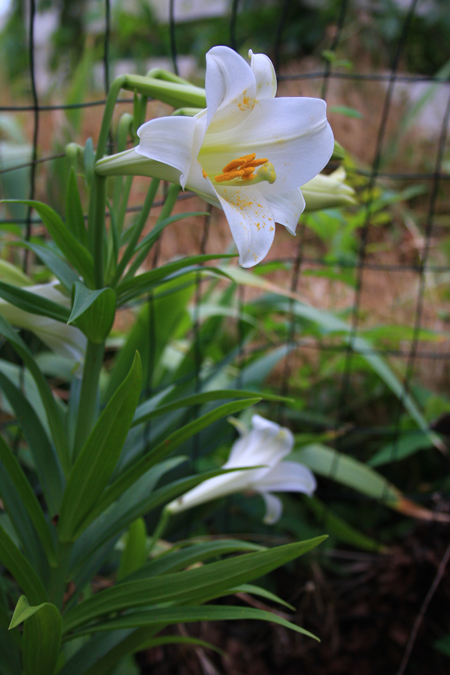
July bloom from a lily garden.
(*photo credit)
July 31, 2011 Do
Not Let Bad News Hinder Our Work
When
Jesus heard of the death of John the Baptist, he withdrew in a boat to a
deserted place by himself. (Mt. 14:13)
My
mother's family physician was a personal friend, and when my dad died right
outside his office with my mother present, he came the next day to our home to
see how she was doing. He asked where she was; we said "In the cellar washing
the sauerkraut." That relieved him at once for even death did not stop those
routines that had to be done in farm life -- and he knew it.
Jesus
was closely attached to his cousin in his ministry and was deeply hurt by the
violence of John's martyrdom. The horror impressed upon him the possibility
that his own ministry could also be cut short. John had spoken plainly and
honestly, and for this he aroused the vengeance of others. Filled with sorrow,
Jesus did what many would do and retreated to a solitary place. However, a
large crowd awaited him at the shore; in his compassion the ordinary duties of
teaching and healing took precedence. Death, no matter how personal, does not
always stop those who are active, though it would have been excusable to say "I
am too saddened to..."
Perhaps
the lesson in today's Gospel has something to say to us as well. The compassion
we have for others helps us to overcome our own shortcomings and troubles. The
world goes on even when sad things happen. If sad events leave us depressed or
unable to perform our duties, we accept who we are; we do need to come closer
to Jesus who worked unto the end, even on Good Friday when he consoled the
sorrowing women, gave his mother to the apostle John, and forgave the penitent
thief. Ministry ought to be close to us.
This
brings us to the so-called retirement years when we know life is ebbing, but
this sad news should not stop us from extending our ministry to more
resource-conserving ventures both material and spiritual. Opportunity always
comes in doing the routine well when we can, and meeting challenges even when
immobility or illness calls to severely limit previous commitments. The Lord
wants us to continue as best we can even when detours and barriers seem
daunting. Troubles and sadness will come, but the underlying happiness that we
are doing our best overcomes all other feelings.
Note:
Some people are paralyzed by grief, and we must recognize and accept their
plight. Our ministry to them is very important, honoring where they are,
respecting their depressed condition, and still, when time and opportunity
arise, to encourage them to sharpen their vision to discover new horizons.
Prayer:
Lord, give us the courage to continue even when the news is not good, and we
have every reason to withdraw to a deserted place by ourselves. Help us see
such times as opportunities and encourage others to do the same.
|